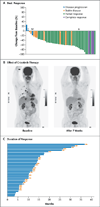Crizotinib in ROS1-rearranged non-small-cell lung cancer
- PMID: 25264305
- PMCID: PMC4264527
- DOI: 10.1056/NEJMoa1406766
Crizotinib in ROS1-rearranged non-small-cell lung cancer
Abstract
Background: Chromosomal rearrangements of the gene encoding ROS1 proto-oncogene receptor tyrosine kinase (ROS1) define a distinct molecular subgroup of non-small-cell lung cancers (NSCLCs) that may be susceptible to therapeutic ROS1 kinase inhibition. Crizotinib is a small-molecule tyrosine kinase inhibitor of anaplastic lymphoma kinase (ALK), ROS1, and another proto-oncogene receptor tyrosine kinase, MET.
Methods: We enrolled 50 patients with advanced NSCLC who tested positive for ROS1 rearrangement in an expansion cohort of the phase 1 study of crizotinib. Patients were treated with crizotinib at the standard oral dose of 250 mg twice daily and assessed for safety, pharmacokinetics, and response to therapy. ROS1 fusion partners were identified with the use of next-generation sequencing or reverse-transcriptase-polymerase-chain-reaction assays.
Results: The objective response rate was 72% (95% confidence interval [CI], 58 to 84), with 3 complete responses and 33 partial responses. The median duration of response was 17.6 months (95% CI, 14.5 to not reached). Median progression-free survival was 19.2 months (95% CI, 14.4 to not reached), with 25 patients (50%) still in follow-up for progression. Among 30 tumors that were tested, we identified 7 ROS1 fusion partners: 5 known and 2 novel partner genes. No correlation was observed between the type of ROS1 rearrangement and the clinical response to crizotinib. The safety profile of crizotinib was similar to that seen in patients with ALK-rearranged NSCLC.
Conclusions: In this study, crizotinib showed marked antitumor activity in patients with advanced ROS1-rearranged NSCLC. ROS1 rearrangement defines a second molecular subgroup of NSCLC for which crizotinib is highly active. (Funded by Pfizer and others; ClinicalTrials.gov number, NCT00585195.).
Figures



Comment in
-
Lung cancer: alternative rearrangements--targeting ROS1 in NSCLC.Nat Rev Clin Oncol. 2014 Nov;11(11):624. doi: 10.1038/nrclinonc.2014.180. Epub 2014 Oct 14. Nat Rev Clin Oncol. 2014. PMID: 25311353 No abstract available.
-
ROS1--targeting the one percent in lung cancer.N Engl J Med. 2014 Nov 20;371(21):2030-1. doi: 10.1056/NEJMe1411319. N Engl J Med. 2014. PMID: 25409376 No abstract available.
-
Crizotinib in ROS1-rearranged non-small-cell lung cancer.N Engl J Med. 2015 Feb 12;372(7):683-4. doi: 10.1056/NEJMc1415359. N Engl J Med. 2015. PMID: 25671264 No abstract available.
-
Crizotinib in ROS1-rearranged non-small-cell lung cancer.N Engl J Med. 2015 Feb 12;372(7):683. doi: 10.1056/NEJMc1415359. N Engl J Med. 2015. PMID: 25671265 No abstract available.
References
-
- Acquaviva J, Wong R, Charest A. The multifaceted roles of the receptor tyrosine kinase ROS in development and cancer. Biochim Biophys Acta. 2009;1795:37–52. - PubMed
-
- Charest A, Lane K, McMahon K, et al. Fusion of FIG to the receptor tyrosine kinase ROS in a glioblastoma with an interstitial del(6)(q21q21) Genes Chromosomes Cancer. 2003;37:58–71. - PubMed
Publication types
MeSH terms
Substances
Associated data
Grants and funding
LinkOut - more resources
Full Text Sources
Other Literature Sources
Medical
Molecular Biology Databases
Miscellaneous
